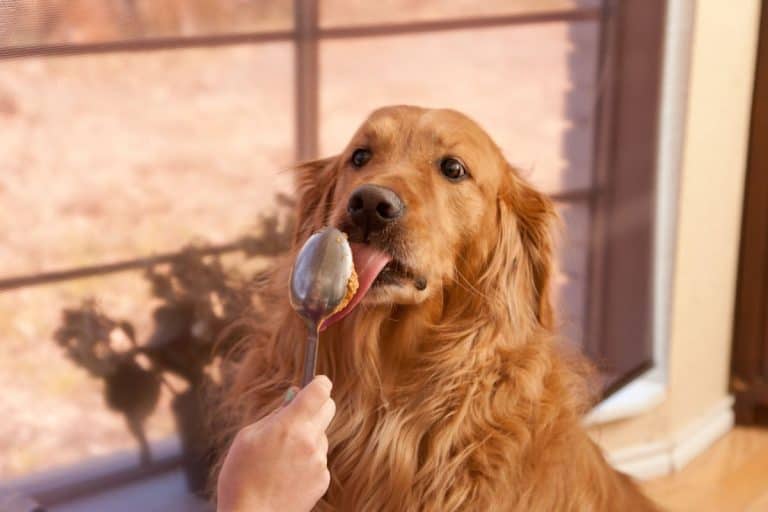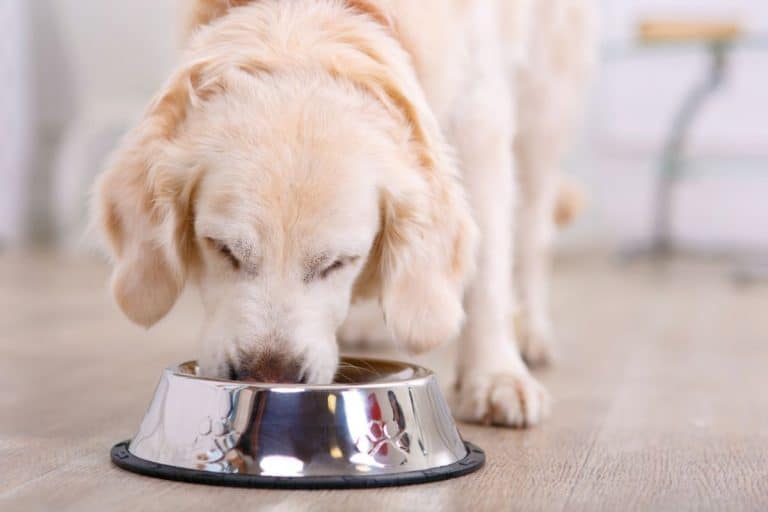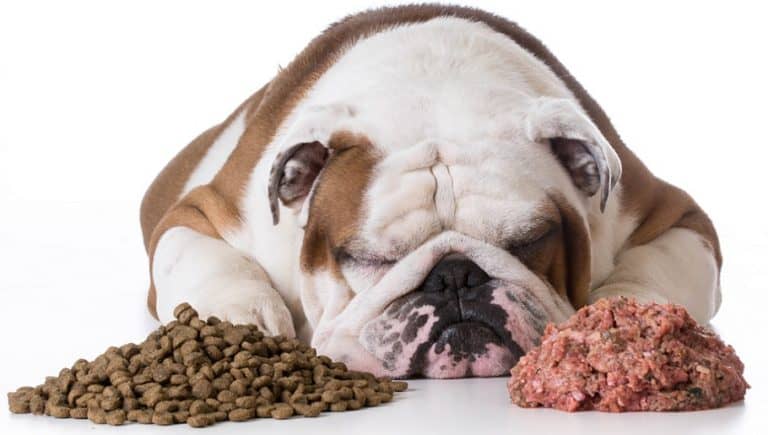Best Food For Lab Puppy (2021)
Any new dog parent will be concerned about giving their new puppy the best food possible and lab parents are no exception.Yet, looking at all of the available food options out there, it is easy to wonder what the best food for a lab puppy is.
You can help find the right food by looking at the food’s ingredients, including what the first ingredient is, what is the percentage of protein within the food, and even the right amount of calories.
We have taken a look at the best puppy foods on the market for labs to help you know what you should be looking for to help your lab puppy become as strong and healthy as possible.
Lab Puppy Nutritional Needs

Every dog breed has different nutritional needs to look out for and labs are no exception. When you are looking for the best food for a lab puppy, you need to know what to look for.
That amount of calories varies based on the age and activity level of your pup, so you might want to calculate their needs to be sure. You can do this using your puppy’s resting energy requirement (RER).
The RER is the amount of energy a body needs to run essential bodily functions like the heart, brain, and other important bodily functions.
You can calculate this by multiplying your puppy’s weight in kilograms to the three-fourths power by 70.
Up to 4 months old, puppies need 3 times the calculated RER and at 5 months to about a year, puppies need 2 times their RER. So a 22 pound (10 kilogram) 4 month old lab will need about 1200 calories a day.
Now, let’s break down the specific nutritional needs of your lab puppy.
Protein
Ideally, a lab diet will consist of high-quality proteins. Their diet should be around 20% protein to help them develop strong muscles.
Proteins should come from meats, such as chicken, beef, and lamb. Chicken is a common allergen, however, so if your pup’s food has it, be aware.
Proteins can also come from other sources, such as fish oil, flaxseed, and can even be found in grains like corn and wheat.
Fat
For a growing lab puppy, the best dog food should be about 8% fat. This often comes from the type of protein that is included in the dog food, but can also be found in added oils, such as fish oil.
Flaxseed will also contribute to the fat content of your dog’s food as will some vegetables.
Carbs
Carbs are a bit of a tricky business with dog foods. On the one hand, there is no specific digestible carbohydrate that has been identified as optimal, but in general, having 20% of a puppy’s diet be carbs is a good idea.
Some of the more healthy carbs include brown rice, sweet potatoes, and anything that has whole grains.
Fiber
Fiber falls under the same percentage as carbs, so just make sure those carbs are full of healthy grains and fiber.
Omegas
There is also not a set amount of omega 3 and omega 6 fatty acids in lab puppy foods, but make sure that they are there. Omega fatty acids are easily found in salmon, but can also be found in some plant oils.
This is also where dogs will get DHA and EPA for brain development.
Best Food For Pitbull Puppy: Quick Picks
[Editor’s Choice]
#1.Royal Canin Labrador Retriever Puppy Food
[Runner-Up]
#2. Nutro Natural Choice Large Breed Puppy
[Budget Friendly]
#3. Iams ProActive Health Smart Puppy
[Wet Food]
#4. Blue Buffalo Wilderness Turkey and Chicken
[For Sensitive Stomach & Skin Allergies]
#5. Purina Pro Plan Puppy Sensitive Skin and Stomach
#1.Royal Canin Labrador Retriever Puppy Food
Best Food For Labrador Puppy (Editor’s Choice)
Our choice for the best food for lab puppies is the Royal Canin Labrador Retriever Puppy Food. This food has a lot of great qualities, but the best one is that it was made specifically for lab puppies, taking all of their nutritional needs into account.
The food has many essential vitamins, such as vitamins E and C, taurine, and lutein. These will all help your puppy’s immune system develop and stay as healthy as possible. The food has also been enriched with calcium and phosphorus for bone support as well.
The kibble itself has a donut shape to it, which will help make it easier to eat in one way, but will also force the puppy to slow down while eating.
Since labs do have a tendency to wolf down their food fast enough to make themselves sick, it is an excellent addition to the food.
While the food does have a lot of wonderful additions, such as glucosamine and fiber, the first ingredient in the food is chicken by-product meal, which means that it is not a human-grade type of protein within the food.
For some dogs, this might be ok, but it is something to keep in mind.
Pros
- Made specifically for labs
- Donut-shaped kibble will help slow down speedy eaters
- Supports digestive health
- Contains Vitamins E and C
- Has calcium and phosphorus for bone support
Cons
The first ingredient is a chicken by-product meal, which isn’t the best quality of meat
#2. Nutro Natural Choice Large Breed Puppy
Runner-Up
Our second-place choice for the best food for a lab puppy is the Nutro Natural Choice Large Breed Puppy formula.
While this food has not been made with labs in particular in mind, it does still have all of the benefits that you would be looking for in a food for large dog breeds.
To begin with, the food is made using a high-quality protein. The first ingredient is real chicken. The food was made with non-GMO, carefully considered ingredients, so you do not need to fret too much about what is actually in the food.
Additionally, the food is devoid of common allergens, such as soy, wheat, and corn, though be forewarned that chicken is also a common allergen. The protein level in this food is 26%, making it much higher than other foods out there.
The food is also rich in other nutrients, including calcium, which will help with your dog’s bone development. The food also has many antioxidants, which will help your puppy’s developing immune system.
These also include omega 3 and omega 6 fatty acids. Other nutrients include glucosamine and chondroitin sulfate, both of which are used to help joints.
Joint trouble is common in large breed dogs, so to have a food that already contains these ingredients is a definite bonus.
Pros
- Made for large breeds
- High quality chicken is the first ingredient
- No common allergens
- Contains calcium and antioxidants
- Made with non-GMO ingredients
Cons
- We didn’t find any
#3. Iams ProActive Health Smart Puppy
Budget Friendly
Large breed dog food is definitely not always easy on the budget. They do eat a lot more than smaller breeds, easily racking up bills you might not have expected.
So, if you need a budget friendly food for your lab puppy, we recommend Iams ProActive Health Smart Puppy Large Breed Dog Food.
This food, like the others we looked at already, is made for large breed dogs specifically. This is really nice to ensure that your puppy is getting the best nutrition for his growing body possible.
To support this, the food comes with glucosamine and chondroitin sulfate, both of which will be incredibly helpful for joint health.
The food also has both omega 3 and omega 6 fatty acids in it, which also supplies DHA. This will help with your pup’s developing cognitive function and will also help with vision.
The ingredients included in the food are quality and chicken is the first ingredient in the food.
The only real downside to the food is that there is a lot of grains and fillers that are potentially allergens for your dog.
You will not know that they are unless your dog has symptoms, however, so it really is just something that you will want to keep an eye out for.
Pros
- Made for large breeds
- Chicken is the #1 ingredient
- Has 22 key nutrients
- Includes DHA for brain function
- Quality proteins
Cons
- Has a lot more grains and allergens than other dog foods
#4. Blue Buffalo Wilderness Turkey and Chicken
Wet Food
If you are looking into a wet dog food for your lab puppy, we have a suggestion for you.
Remember first that wet food is not the ideal type of food for labs and it can get expensive very quickly. That said, sometimes wet foods are necessary or can act as a nice treat for your puppy.
The Blue Buffalo wet food is completely grain-free and is made with a lot of high-quality ingredients, including real chicken and real turkey, which help make it high-protein.
The food also does not have any soy or other common allergens to contend with. There are not any artificial flavours or preservatives in this food either, so you do not need to worry that the food has anything in it that is bad for your puppy.
The food is rich in DHA as well, which will help with brain support, eye, and even cognitive development, all of which are essential to how well your dog will behave when he comes an adult.
The food is not made specifically for large breed dogs, but is instead more for any dog that needs wet food. This can be added to dry food as well if you need to enhance the flavour or will also work well to hide medicine.
Pros
- Grain-free
- Formulated with DHA for brain health
- Has both real turkey and chicken
- No soy or other allergens
- No artificial flavours
Cons
- Not specifically made for large breed dogs
#5. Purina Pro Plan Puppy Sensitive Skin and Stomach
For Sensitive Stomach & Skin Allergies
Some puppies are more prone to skin and stomach upset than other puppies out there. If your puppies seems to be showing signs of sensitivity or you already know that there is an issue with your puppy’s stomach, we recommend the Purina Pro Plan Puppy Sensitive Skin and Stomach Formula.
This food actually comes as a bundle with Dr. Lyon’s Probiotic Daily Digestive Health Support, which is especially helpful if you are dealing with digestive issues.
The first ingredient in the Purina Pro Plan is salmon, which is an excellent form of protein for lab puppies. Since some puppies have issues with chicken salmon is a safe choice.
The salmon also contains DHA and omega 6, both of which will help your puppy’s cognitive growth and function.
There is some dried chicken liver added to the food, but since it is an organ and not the meat itself, the pup is less likely to have issue with it. The liver enhances the flavour of the food to make it more appetizing to dogs.
The really nice thing about this food is that it is made for dogs that are having stomach and skin issues, giving you an easy solution to frustrating conditions. Instead of battling and elimination diet, you can feel safe with this food choice.
Pros
- Salmon is the first ingredient
- Delivers four live and active cultures
- Formulated to support intestinal health
- Contains DHA
- Dried chicken liver is added for flavour
Cons
- We didn’t find any
#6. Hill’s Science Diet Large Breed Puppy
Another great option of food for lab puppies is the Hill’s Science Diet Large Breed Puppy formula. This is another food that was made with large breeds in mind, ensuring that your large breed puppy is receiving the type of nutrients that he needs to be healthy.
The Science Diet formula is made without any artificial flavours, colors, or preservatives, so you know that the food is going to have quality ingredients.
It is also made in the USA, where there are more stringent food regulations than in other locations. This should give you some peace of mind about the origins of the food.
The only issue we have with this food is that the first ingredient is a chicken meal. While this helps with protein, this is not the same as a human-grade level of chicken.
The food also has lots of grains, which can be good for fiber, but can also cause your puppy to become overweight or have skin issues. Your puppy might not have any issue with this, so keep a lookout.
The food is rich in a lot of nutrients as well. It has calcium, vitamin E, vitamin C, and even has DHA for health development and health.
Pros
- Made for large breed puppies
- Made from natural and high-quality ingredients
- No artificial flavours or preservatives
- High in protein
- Made in the USA
Cons
- The first ingredient is a chicken meal rather than a human-grade of meat
#7. Eukanuba Large Breed Puppy
Another one of the best foods for lab puppies that we found is the Eukanuba Large Breed Puppy Formula. This is another food that has been designed with labs in mind.
It is really nice to have a food that you know is meant to help your puppy grow and become as healthy as you would like him to be as an adult.
The food is made to support muscle and bone health, both of which are incredibly important for large breeds. This will help support their joints as they go, since large breeds are more prone to receiving a joint injury than smaller dogs are.
The first ingredient in the food is chicken, which is exactly the kind of high quality proteins that you should be looking for when you are looking for puppy food.
The DHA that is included in the food also helps with brain development and cognitive function, helping your puppy be as smart as possible.
The only downside to this food that we found is really hypothetical. The food has corn, wheat, soy, as well as other common allergens that labs suffer from.
These ingredients will not bother the majority of dogs, but it is something to keep an eye on as your puppy adjusts to the new food.
Pros
- Made specifically for large breeds
- Supports muscle growth and bone health
- High in protein
- Chicken is the number one ingredient
- Contains DHA
Cons
- Contains the common allergens like corn, wheat, and soy
#8. Taste of the Wild Pacific Stream Puppy Formula
The last food that we are going to rank as one of the best foods for lab puppies is the Taste of the Wild Pacific Stream Puppy Formula.
This is an incredibly healthy food option that should work really well for most puppies. This food is great for dogs that have stomach issues as well, because it is enriched with species-specific probiotics for dogs, which can help maintain gut health.
Smoked salmon is the primary ingredient with this food as well, which is how the food is so rich in DHA and omega fatty acids. Both omega 3 and DHA will help your puppy’s cognitive growth and function.
The food is made without any grain, corn, or any kinds of artificial flavours and colors, so you know that it is always going to be a healthy option.
The only con that we found with this food is that some puppies are not on board with the flavour of it.
Since labs are such food loving dogs, you can be stubborn and allow the dog to get a little hungry before each meal to see if he will be willing to keep it down. Most labs are not picky regardless.
Pros
- Smoked salmon is the number one ingredient
- Made with vitamins and minerals from real foods
- Rich in DHA and omega fatty acids
- Contains species-specific K9 probiotics for gut health
- Made without grain, corn, or artificial flavours
Cons
- The taste is not appealing to all dogs
Labrador Puppy Feeding Schedule
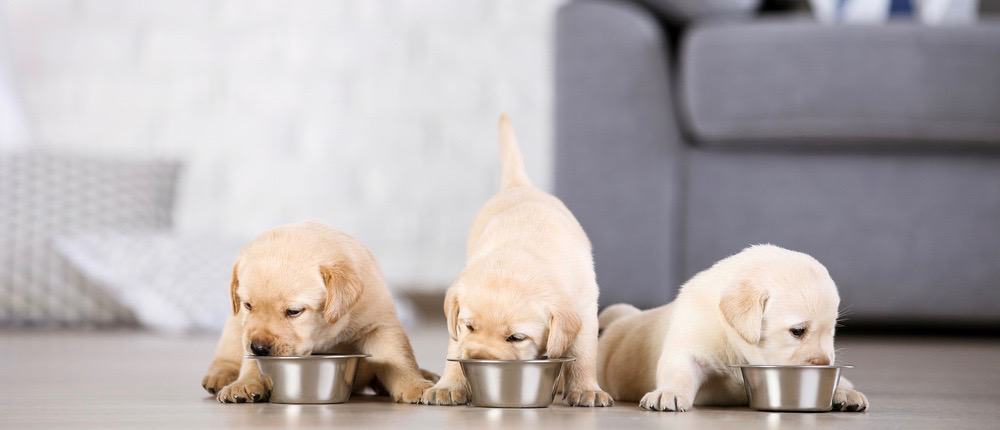
The amount of food that your puppy needs a day will vary depending on his age.
6 weeks old: Your puppy should be eating puppy food at this point, but the puppy might also be nursing a little bit with his mother. Most of his sustenance should be coming from his food. A puppy should be eating maybe a cup to a cup and a half total at this age.
8 weeks old: When your puppy is 8 weeks old, he should be at his new home. Lab puppies should get 3 meals a day at this point as well and will eat 2 cups of food a day, divided into those 3 meals.
12 weeks old: At 12 weeks old, your puppy can move to just 2 meals a day and should be eating 2-3 cups of food a day.
After 12 weeks, you can expect to feed your puppy 3-4 cups total of puppy food, adjusting as he grows.
Wet Food vs Dry Dog Food For Lab Puppies
There are pros and cons to both wet and dry dog food. When considering whether your lab puppy should eat wet or dry food, in general, you are going to want to go with dry dog food.
Dry kibble is much better for a dog’s teeth as it breaks off the plaque. It also is less fatty and less expensive.
Wet food does have a better taste and can help a pup who needs to gain some weight do so effectively. But, unless something is amiss or your vet tells you otherwise, stick with dry dog food for your lab.
What To Do If My Lab Puppy Doesn’t Want To Eat?
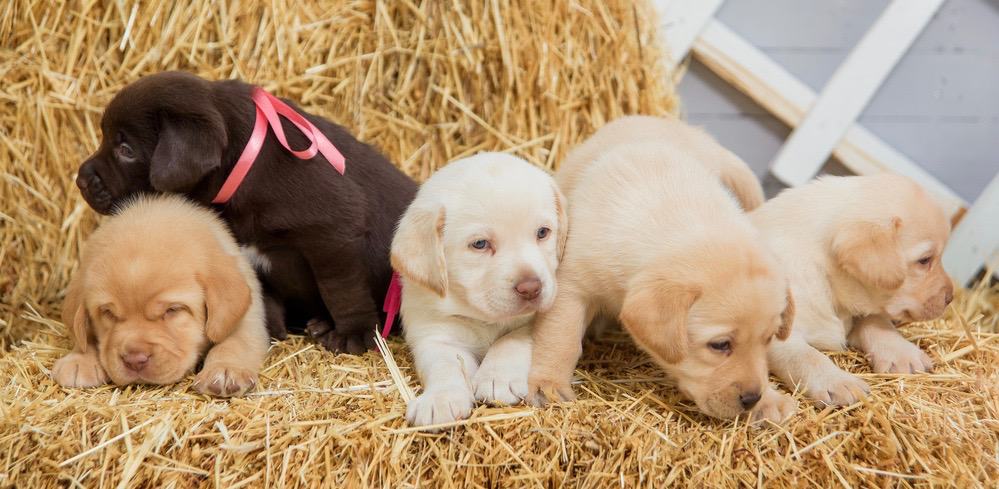
If your lab puppy is not eating his food, you will need to troubleshoot what’s going on. The first question is whether you have recently adopted the puppy.
If your puppy is new to your home, he might need a few days of adjustment to be interested in food. Likewise, if you have changed up what he is eating, he might take a few days to become adjusted.
Since labs are such voracious eaters, if there are no changes in his life or diet and he is not eating, then it is a good idea to take your puppy to the vet to see what’s wrong.
What To Do If My Labrador Has A Sensitive Stomach?
All dog breeds run the risk of developing sensitivities. There is no way to know whether your puppy will be prone to them or not until he has been introduced to the specific foods. Sensitivities can be caused by sudden changes in food or natural allergies.
To avoid sensitivities, feed your puppy consistently and do not change food suddenly. Instead, change the food gradually over the period of many days. If your puppy is showing signs of a sensitive stomach, call your vet for guidance.
There are also puppy foods out there that are specifically made for digestive health.
Can You Free Feed A Lab Puppy?
Freefeeding is when you are able to leave your dog’s daily allotment for food out in the morning and allow the dog to just eat has he becomes hungry throughout the day.
In theory, this seems like a good idea. In fact, with smaller breeds, this is recommended for younger puppies. This is not the case with labs.

Labrador puppies cannot be freefed. You need to measure out their daily allotment into meals throughout the day.
Otherwise, your puppy will eat it all the second you set it out and be starving for the rest of the day. Labs do not have self-control when it comes to food.
Switching From Lab Puppy Food To Adult Food
Your lab puppy will need to change from puppy food to adult food when he is about a year old. By a year, labs will have stopped growing as far as height and bone growth goes.
When you change food, you will need to do it slowly over the course of several days. To begin with, add in about a quarter of a cup of adult food to each meal, removing the same amount in puppy food.
After a day or so, increase the adult food so it is half of the daily allotment. Continue to do this until your puppy is solely on adult food.
Final Words
While there are definitely a lot of great puppy foods out there, we still found our favourite to be the Royal Canin Labrador Retriever Puppy Food.
This dog food was excellent, because it was made especially for lab puppies, ensuring that it meets the breed-specific nutritional needs for your puppy.
We also found that the Nutro Natural Choice Large Breed Puppy formula was a healthy option for lab puppies and is full of healthy ingredients.
Regardless of the food that you go with, pay close attention to the ingredients to ensure that your puppy is getting the very best food possible.


